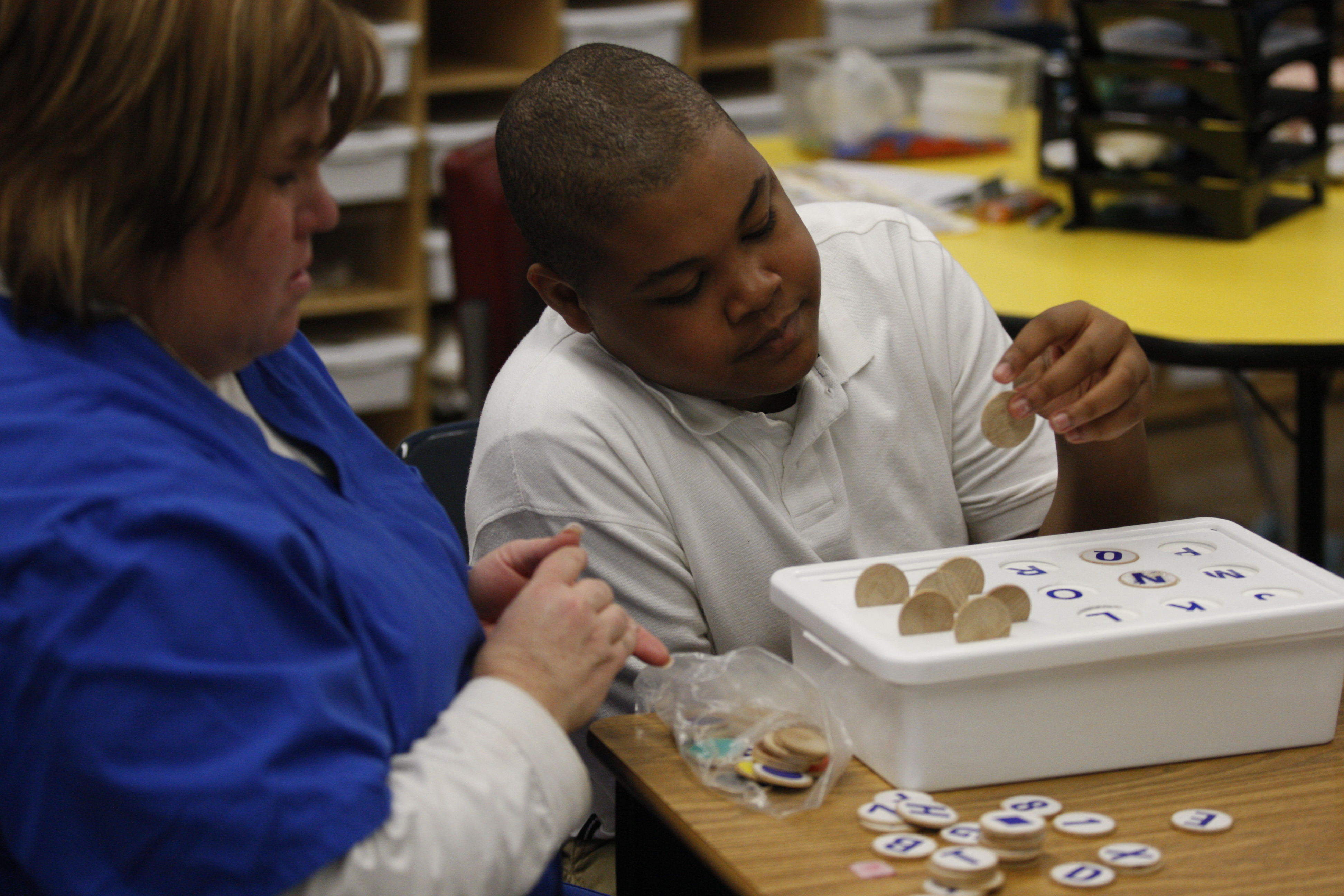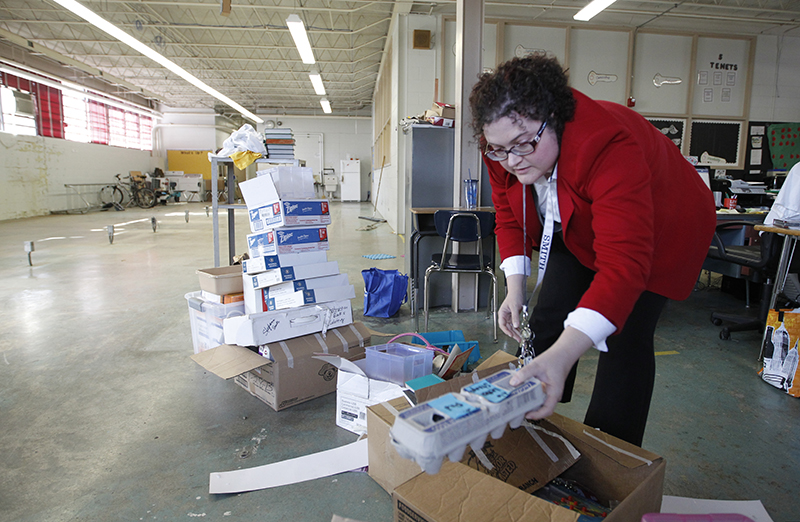Work training just the start of unique Orchard Knob special education program
Wednesday, December 18, 2013
 Developmental Communication Classroom instructor Kristin Roberts, left, helps student Alex Simmons with an alphabet exercise Tuesday at Orchard Knob Middle School in Chattanooga. Community volunteers began renovations of an old vocational classroom over the weekend to make way for a new Community Based Instruction classroom for special needs children that will offer workstations to help develop real-life skills.
Developmental Communication Classroom instructor Kristin Roberts, left, helps student Alex Simmons with an alphabet exercise Tuesday at Orchard Knob Middle School in Chattanooga. Community volunteers began renovations of an old vocational classroom over the weekend to make way for a new Community Based Instruction classroom for special needs children that will offer workstations to help develop real-life skills.Teacher Kristin Roberts knows that few, if any, of her pupils will wind up at a university or college.
Roberts, a special education teacher at Orchard Knob Middle School, teaches some of the county's most significantly impaired students. Her classroom of five includes students on the autism spectrum and others with limited communication skills.
But despite their challenges, Roberts wants her students to reach independence, eventually living on their own and earning their own living.
That's why the school is pushing an expanded vocational training program for special education students. With the help of businesses and community partners, the school will set up work stations, teaching kids real-life work skills on top of the academics. Officials say such extensive vocational training for special education students is unlike anything else offered in Hamilton County's public schools.
"When you look at it, most of them aren't going to college," Roberts said. "So we're doing them a disservice if we're not helping them develop a skill that they can use in the community."
Roberts teaches students in a Developmental Communication Classroom, or DCC, the county's most intensive special education program. Orchard Knob is working to increase opportunities for students in the DCC classroom, as well as those in CDC, or Comprehensive Development Classroom, another specialized, though less intense, special education program.
The school's new Succeed program -- short for Students Utilizing Classroom and Community to Enhance Everyday Development -- is aimed at offering more specialized job and independent living training on top of other academic programming for the 20 or so students in the school's CDC and DCC programs. The school will construct individualized stations to help sharpen students' domestic, vocational, community and recreational skills.
To do that, a group of this year's Leadership Chattanooga participants is helping to renovate an old vocational education shop into mini work stations. One room is set up as an efficiency apartment, complete with a kitchenette. One area will eventually resemble a grocery store. Another, a dry cleaner. Another, an office.
"We're trying to make things as real as possible so when they go and get jobs they'll be ready," said Kevin Lusk, a Leadership Chattanooga participant working on the project.
The group is recruiting companies to both donate materials and to sponsor individual work stations with the aim of completing work by April. A $20,000 grant from the Community Foundation of Greater Chattanooga is also helping fund the project.
In jobs training, students will mostly learn simple, repetitive tasks, like bagging groceries, filing paper, making copies or folding clothes.
"Those are jobs that when developed appropriately are sort of routine. That's what our kids thrive in," said Orchard Knob Principal Crystal Sorrells. "Bagging groceries is pretty much the same every time. Making copies is pretty much the same every time. They may not be the most exciting tasks, but they have to be done."
But students will learn softer skills, too. One area will be set aside for leisure, teaching the students how to take a break from work. Roberts said there are other small social cues the kids need to learn to thrive in the workplace. Like knowing how to call in sick without giving too much information about one's ailment. Or learning that not every person who shakes your hand is in love with you.
"We can teach them any of the hard skills -- how to do the work," Roberts said. "It's the soft skills that could make them lose their jobs."
Part of the Succeed program will allow some students to stay at the school past eighth grade, until age 16. Special education students are legally entitled to stay in school until the age of 21 or 22, depending on their birth date. So it's not unusual for some to spend seven or eight years in high school.
"I think it probably is a very good concept. That way it balances the time they spend in middle school and the time they spend in high school," said Linda Johnston, interim director for the School of Education at the University of Tennessee at Chattanooga.
Johnston has decades of experience in special education, both teaching in public schools and in academia. She said Orchard Knob's new program sounds like it's at the forefront.
"This is interesting because they're starting this at the middle school, which is a good thing," she said. "They're preparing them early on to begin thinking about the job market."
Margaret Abernathy, the county's special education director, said the school system is always working to expand its continuum of special education offerings, whether they be focused on academics, vocational skills or independent living. In all, there are 11 DCC classrooms spread across the county's 75 or so elementary, middle and high schools. The county has other work-based special education programs, Abernathy said, but nothing like what Orchard Knob is building.
"When we're programming for students and working with parents, we're looking at them through the school-age years," she said. "But we're also trying to plan and give them the skills they need for the rest of their life and independent living."
Contact staff writer Kevin Hardy at khardy@timesfreepress.com or 423-757-6249.

